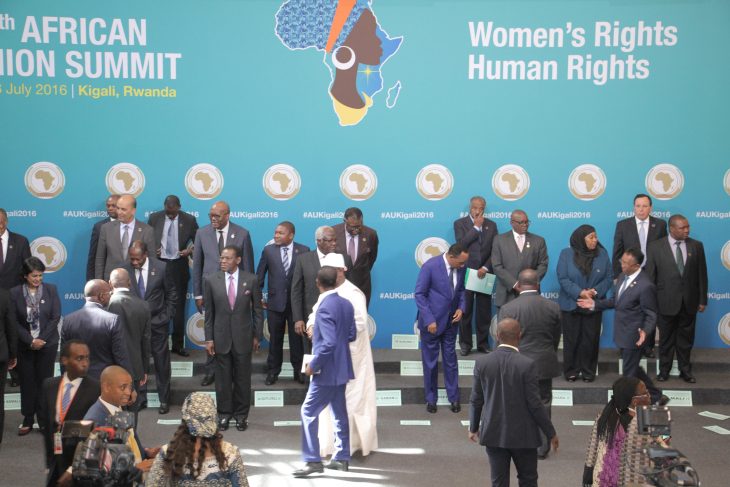The transitional justice week was marked by the African Union (AU) summit in Kigali, which had been expected to confirm the war between the continent and the International Criminal Court (ICC). But, as our correspondent Emmanuel Sehene Ruvugiro writes, the summit delivered little of note on this.
“Rwandan Foreign Minister Louise Mushikiwabo announced on the eve of the summit that the African leaders would discuss the issue, but current AU president Idriss Deby of Chad did not even mention it, either in his opening or closing speeches,” says our correspondent. “So the world did not see the usual threats and accusations against the ICC that some African leaders have become accustomed to making in their speeches.” The most likely explanation for this strange silence is disagreement between the Heads of State over how to deal with the Court, which they have accused of “racism” and “anti-African bias”.
This debate is all the more interesting coming at a time when the African Union and the African continent have successfully tried one of their own, former Chadian president Hissène Habré, at a pan-African court. JusticeInfo’s editorial adviser Pierre Hazan stresses that the Extraordinary African Chambers (EAC) found Habré guilty of personally committing “sexual crimes”. This is the first time a former Head of State has been convicted for this. “It is only recently that international criminal law has started imposing heavy punishments for rape,” writes Hazan. “It was not until the Kunarac judgment of the International Criminal Tribunal for the former Yugoslavia (ICTY), which convicted three men, that rape was for the first time considered to be a crime against humanity, since it was part of an ethnic cleansing campaign.”
In 1998, the International Criminal Tribunal for Rwanda (ICTR) considered in the Akayesu case that rape could be a constitutive act of genocide. “The Tribunal explained that raping women from a community can be considered raping the body of the community and so undermining its social fabric,” writes Hazan. “On March 21, 2016, the International Criminal Court (ICC) found Jean-Pierre Bemba guilty of crimes against humanity and war crimes, including sexual violence and rape against women and men by his troops in the Central African Republic.”
Sri Lanka and CAR
JusticeInfo also focussed on two countries that are geographically and historically far apart but which are asking themselves the same questions about transitional justice: Sri Lanka and the Central African Republic (CAR). Both countries are emerging from deadly civil wars. Marie-Thérèse Keita-Bocoum, the UN’s independent expert on human rights in the CAR, explains in an interview that rehabilitation of the country’s collapsed judicial system will be impossible whilst the insecurity caused by armed groups defying the new government continues. Keita-Bocoum has high hopes of the Special Criminal Court to be set up in the CAR, which is to include both national and international judges to ensure its efficience and impartiality.
Richard Rogers, a former legal adviser to the OSCE and member of a panel asked by the Tamil community to monitor transitional justice in Sri Lanka, told JusticeInfo that country also needs international judges because “local actors are simply too vulnerable and too partisan to manage a war crimes court by themselves”. But so far the Sri Lankan government has opposed any international presence on courts as advocated by the international community and the UN. And so the debate on what type of court is most appropriate to try war crimes and crimes against humanity – national, international or hybrid – is taking place across the world, including in Kigali, Colombo and Bangui.






